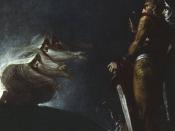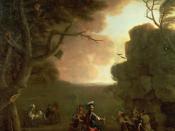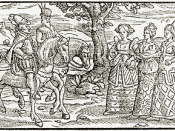The supernatural tends to play a large part in many of Shakespeare's plays. From The Tempest to Hamlet, different supernatural themes are explored and presented to further the plot along. The supernatural plays n extremely large and important role in Macbeth. In Macbeth, there are instances of witchcraft, hallucinations, and even ghosts. But what exactly is the supernatural and how does it move the plot? By examining the play we can see that the supernatural not only plays a part in the plot, but it is the point that allows the plot to move onward.
The supernatural is defined as anything that does not comply with the laws of nature; anything magical or mystical. Therefore the supernatural refers to encounters with ghosts or demons, witchcraft and the occult, foreseeing the future, a 'sixth sense' type of feeling, seeing things and much more. Macbeth deals with all of these aspects at one or more points throughout.
The first instance of supernatural activity is in the opening scene when we are introduced to the three witches or "Weird Sisters" as they are called later on. Right away it is made clear that there is something evil and unnatural about these women. Their familiars seem to be calling to them and this is the first aspect of the witches we get to see. Familiars are attendants that allow one to perform black magic. Since these women have familiars it is safe to say that they are members of the occult. These witches reappear throughout the play and offer predictions and magic whereby becoming much more important to the plot.
Such is the case in act one scene three when Macbeth meets these Weird Sisters. The witches offer Macbeth news of what is in his future. Macbeth, who is already Thane of Glamis is told that he will also become Thane of Cawdor and that he "shalt be king hereafter" (50). Clearly these witches must be wrong, for both of these men still live. But were these predictions, or just an attempt to overthrow Scotland's powerful men through Macbeth. The first prediction has to be just that, a prediction. There is no way these women could have known that Macbeth will become Thane of Cawdor without being able to see into the future. But the news of Macbeth becoming king is a little more questionable. It is possible that the witches wanted to do away with the king and were hoping that by telling Macbeth he would become king that it would stir him into action to murder Duncan, the current king of Scotland. It's almost as if they were feeding into his ambitions. But this theory raises further questions. If they witches wanted Duncan dead, why didn't they just curse him or kill him themselves? As doers of evil, it was probably much more fun to watch a man deteriorate and wreak havoc.
Macbeth is clearly startled and aghast at this news. He starts questioning the witches, demanding answers to which they reply by leaving him "as [breathes] into the wind" (82). This now becomes our third instance of the supernatural: vanishing into thin air. This act is obviously impossible by normal human standards, but the witches have evil spirits on their side aiding them in their cause. While the power of vanishing would be useful for anyone, it is of particular use to the practitioners of magic. Those who practice magic are obviously evil and would understandably do evil things to keep from getting harmed in situations like this, being able to disappear completely would be handy. It is also possible that they wanted to stir Macbeth so much they realized that vanishing would disturb him into thinking about this meeting a lot.
It is true that Macbeth never forgets his meeting with the witches, because shortly thereafter, he is hailed Thane of Cawdor. The title is announced by Ross who enters bringing the news from the King himself. Macbeth is now experiencing a shock never felt before. Not only is this shock from a seemingly impossible prediction coming true, but also shock from purely receiving the new title. His shock is not helped by Banquo's skepticism. He believes that the witches must be plotting something since they have "more in them than mortal knowledge" (1.5, 3) and their kind often tell truths in order to "win us to harm" (123). Banquo's opinion clearly affects Macbeth's thoughts, stirring him to skepticism also. Macbeth starts worrying that "this supernatural soliciting ... cannot be good" (131). He has no idea what he has gotten himself into.
Supernatural tendencies also appear in act one scene five wherein Lady Macbeth reads of what has happened to Macbeth and plots to kill Duncan. Lady Macbeth begins to plead to whatever evil spirits may be listening that they may help her in her deed. This is supernatural because spirits cannot be explained by the laws of nature, if they even exist.
In the beginning scene of act two, we see a different kind of supernaturalism. Macbeth is preparing to kill Duncan when something intervenes causing him to see a dagger with the hilt pointing towards him and the blade pointing towards the room where Duncan is sleeping. Macbeth, clearly shaken, begins to question the dagger, hoping that it is "a dagger of the mind, a false creation" (38). Which may very well be true; hallucinations like this can be brought on by a number of things such as "psychological breakdown.. [and] periods of high emotion" (Dr. Richard A. Kasschau, 1995). They can also be caused by sleep deprivation. Arguably, Macbeth is experiencing all of these symptoms: high emotion from all the changes he is experiencing, psychological breakdown from all the murders has committed and is planning on committing and he is presumably suffering from a lack of sleep brought on by the previous symptoms and perhaps even a little guilt.
Immediately after, in the following scene, Macbeth murder Duncan, frames it on his guards and then Macbeth hears a voice saying "sleep no more. Glamis has murdered sleep" (45). This voice scares Macbeth so much that he starts getting "brainsickly" (50). It is clear that no one else has heard the voice, since no one else in Inverness is stirring.
But strange things were witnessed in the night by others. Ross and an old man discuss these bizarre events the next morning in act two scene four. It is said that Duncan's horses, usually calm and well behaved, escaped from their stalls, turned wild and caused some havoc, wounding people and then ate each other. Is it possible that these horses, so close to Duncan, could sense his death, or even feel his pain? This is such a strange occurrence it has to be supernatural.
Perhaps the most obvious case of supernatural activity manifests itself in act three scene four in the form of a ghost. There is to be a celebratory dinner at Inverness, but one party member is missing: Banquo. He eventually turns up in the form of an apparition that only Macbeth can see. Banquo never speaks, but his sheer presence speaks volumes. Obviously being murdered did not please Banquo's spirit and he turns into a ghost to come and haunt Macbeth and make him obsess over his own guilt. But is this ghost real or is Macbeth seeing things again?The last scene where we see supernatural activity is in act four scene one. In this scene Macbeth seeks out the weird sisters for answers of their magic. The witches offer him three more 'predictions; from three separate apparitions. The first apparition wars Macbeth to beware MacDuff, and rightfully so since it is MacDuff that eventually leads to Macbeth's downfall and death. The second apparition says that none born of a woman will ever harm Macbeth. This gives Macbeth extreme pleasure, since everyone is born of a woman. But it is false hope, since he will ultimately meet his end at the hands of another man. The third apparition makes Macbeth equally happy because he is told that he will only meet his end when Birnam Wood and Dunsinane Hill come together. Clearly forests cannot move and that is the hope Macbeth gets from this apparition.
But why is the supernatural so important in Macbeth? It is a very easy way to achieve plot twists and manipulate characters. It is also a large theme at the time it was written. Belief in the occult and witchcraft were very real in the 17th century. As law abiding Christians, any dubious activity would cause a lot panic. This play could have been a sort of warning to the public about dipping into the magical world or even just to show people what it's like. The witches provide a very clear example of evil and the occult and those watching the play may be spurned on towards this life or completely repelled from it.
It is clear that the witches provide an interesting turn in Macbeth's reality, but what about ours? The witches also provide a very interesting curse on our reality. This curse is often said be a superstition, but it is "so old, so all-consuming, so intimidating" that practically everyone working in the theatre believes it. This is known as the Curse of Macbeth. Macbeth is often regarded as the unlucky play, since it seems to carry with it a trail of calamity. There are many documented instances of deaths and other tragedies that have befallen people associated with putting on this play. For example, in a 1937 production of Macbeth, Laurence Olivier was sitting in the wings waiting for a cue and the moment he got up a 25 pound weight came crashing down on the chair he was sitting on. He would have been instantly killed. During the same production, a woman's dog got run over and she herself died of a heart attack. Another woman in the production got into a car accident.
This so called Curse of Macbeth takes on many forms. Simply saying the name of Macbeth in a theatre while a production is in process is not wise. It's not wise for several reasons; one being that you pretty much just cursed the current production and two, anyone who hears your will probably flog you to death for saying it. Fortunately there is a 'counter-curse' to saying the name of Macbeth in the theatre; it's a sort of exorcism: the offender must go out of the room they are in, turn around three times, spit, knock on the door and beg humbly for permission to re-enter. Swearing is supposedly a form of good luck so some would say that after spitting and before knocking you must swear as loud as you can. Another oral offence is quoting a line from the play. The 'counter-curse" for this offence is to recite a phrase to reverse the luck. It is to recite a line from The Merchant of Venice (believed to be a lucky play) said by Lorenzo in act three scene four: "â¦fair thoughts and happy hours attend on you."Several other versions of the curse involve using props, costumes or set pieces previously used in a production of Macbeth. In fact, when traveling Shakespeare companies were in their hay day, they would have to cart around props, costumes and set pieces that could be used for all plays interchangeably; except Macbeth. No matter how expensive it was, or how many people needed to be hired to help transportation, nothing used in Macbeth was to ever be mixed with the 'regular' objects.
Critics of the curse claim that disasters are inevitable for a play that requires plenty of dim lighting, set changes and duels, but this does not account for traumas that are not received inside the theatre. In 1954 there was a revival aimed at producing all of Shakespeare's plays. The cast and crew of the revival experienced two women getting abortions, an attempted suicide and the manager broke both his legs in a car accident. This revival when on tour and when the cargo was being unloaded in Cape Town, South Africa, a man walked by and asked what play was being performed. One of the stage hands replied 'Macbeth' "⦠and the minute he had said it, a spear which was being craned up and poised high in the air with a bundle of others, dislodged itself and fell right onto the strangers head, killing him instantly."But all these instances beg the question, why is Macbeth so unlucky? Is it really just a hoax, or should it be taken with sincerity? Macbeth is unarguably the darkest play Shakespeare ever wrote, "it is the only play in which witchcraft, black magic and Satanism not merely play an important part, but provide the vital pivot on which the entire plot depends." But the curse lays in the power of the witches. Shakespeare had a compulsive need to be authentic in his plays, and in order to obtain authenticity in Macbeth, it is said he used a witch's incantation found in a real black magic book for the witches' in act four scene one. The ingredients chanted by the witches, it is said, are ingredients in an actual potion, with actual powers. Many blame Shakespeare's need and want of authenticity as the source of Macbeth's curse.
The point is, supernatural activity is an easy way to transform plots and characters. Shakespeare has used the technique quite successfully in his previous plays and this one is no less successful. The use of this supernatural activity injects the play with horror, tension and suspense. The supernatural activity in Macbeth allow him to pursue what he thinks he wants, as told by the weird sisters. His acts end up turning into other unnaturalness which leads to his decent into madness, and ultimately, his end.
Works CitedHuggett, Richard. The Curse of Macbeth and Other Theatrical Superstitions. Great Britain: Picton Publishing, 1981.
Kasschau, Richard A. Understanding Psychology. New York, New York: Glencoe McGraw-Hill, 1995.
Kranz, David L. "The Sounds of Supernatural Soliciting in Macbeth." Studies in Philology. Volume 100.3 (2003): 346 - 384Shakespeare, William. "Macbeth" The Complete Works of William Shakespeare. Ed. David Bevington. Toronto: Pearson Longman, 2003. 1255 - 1292





